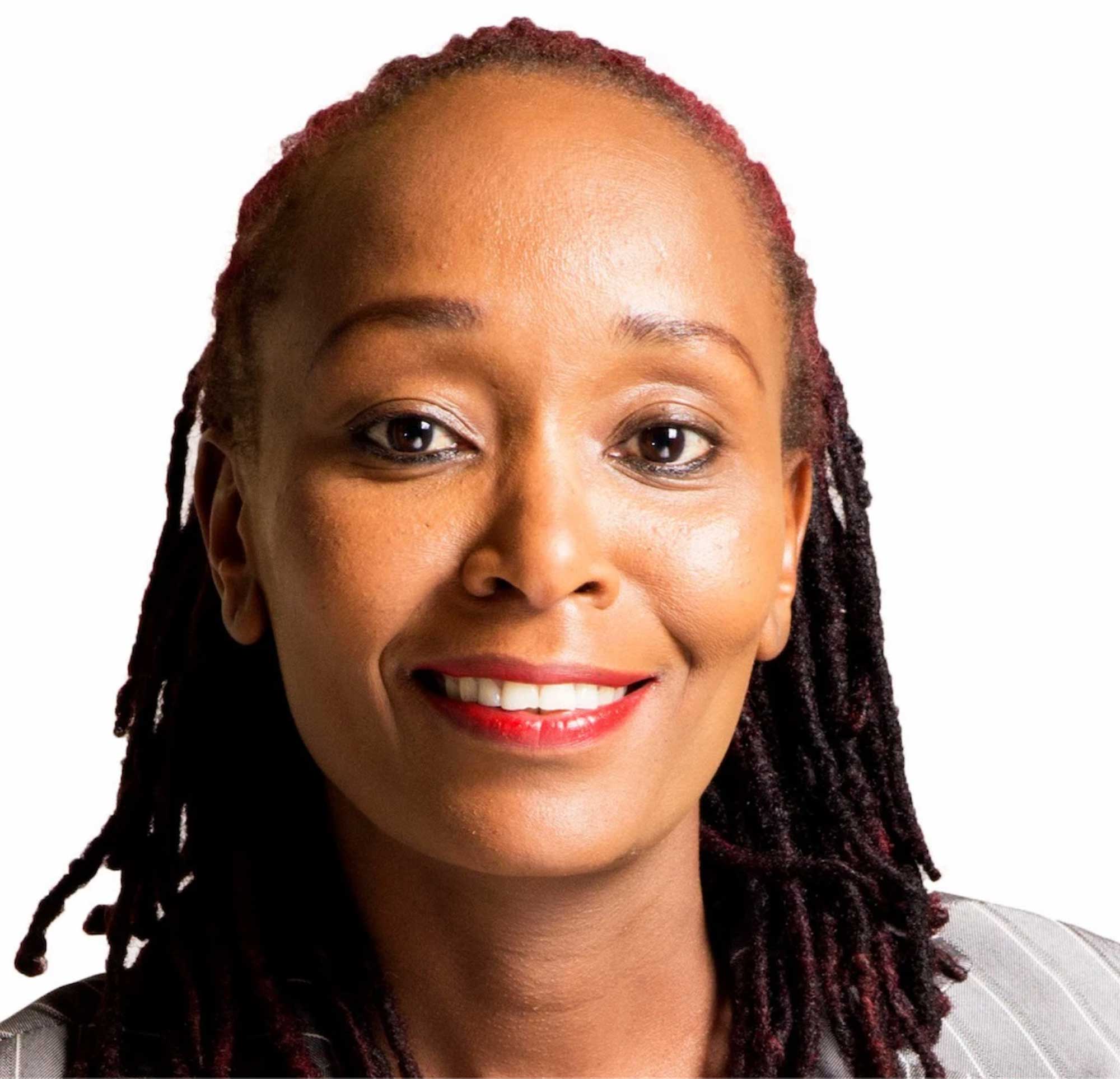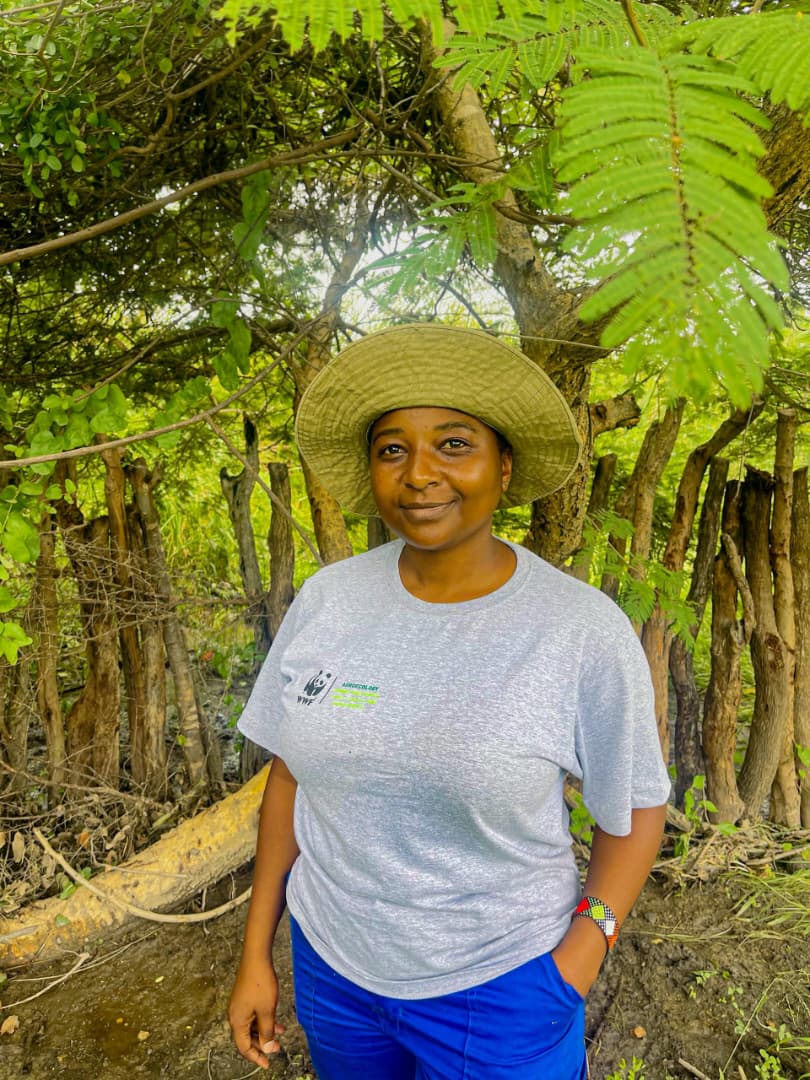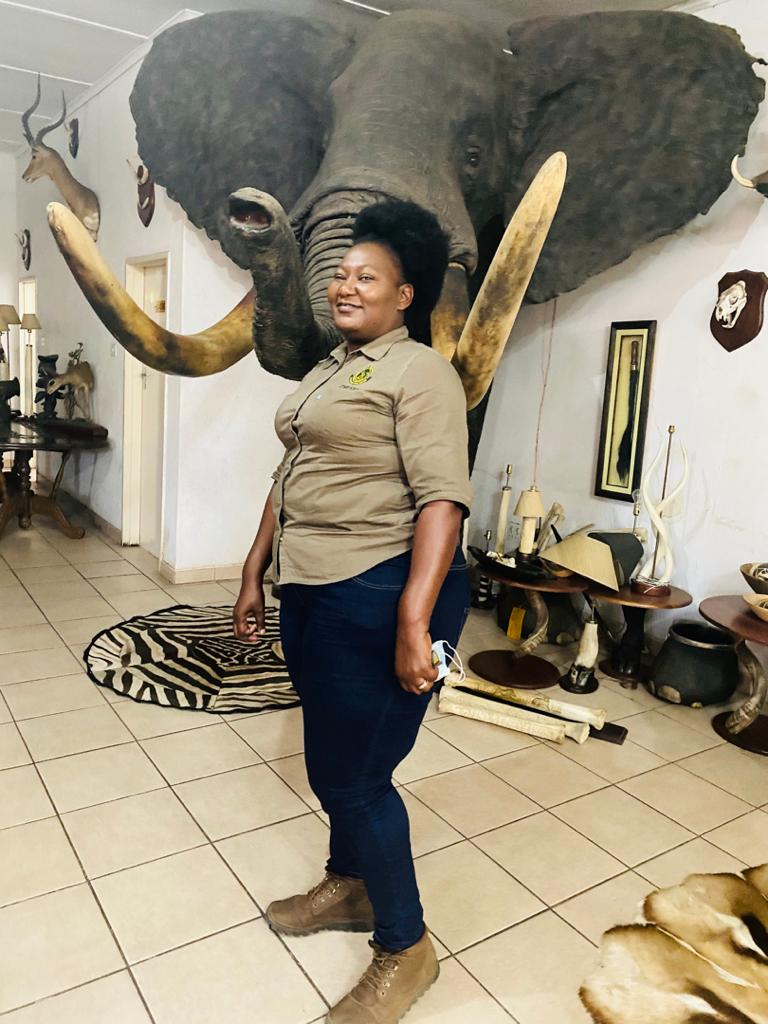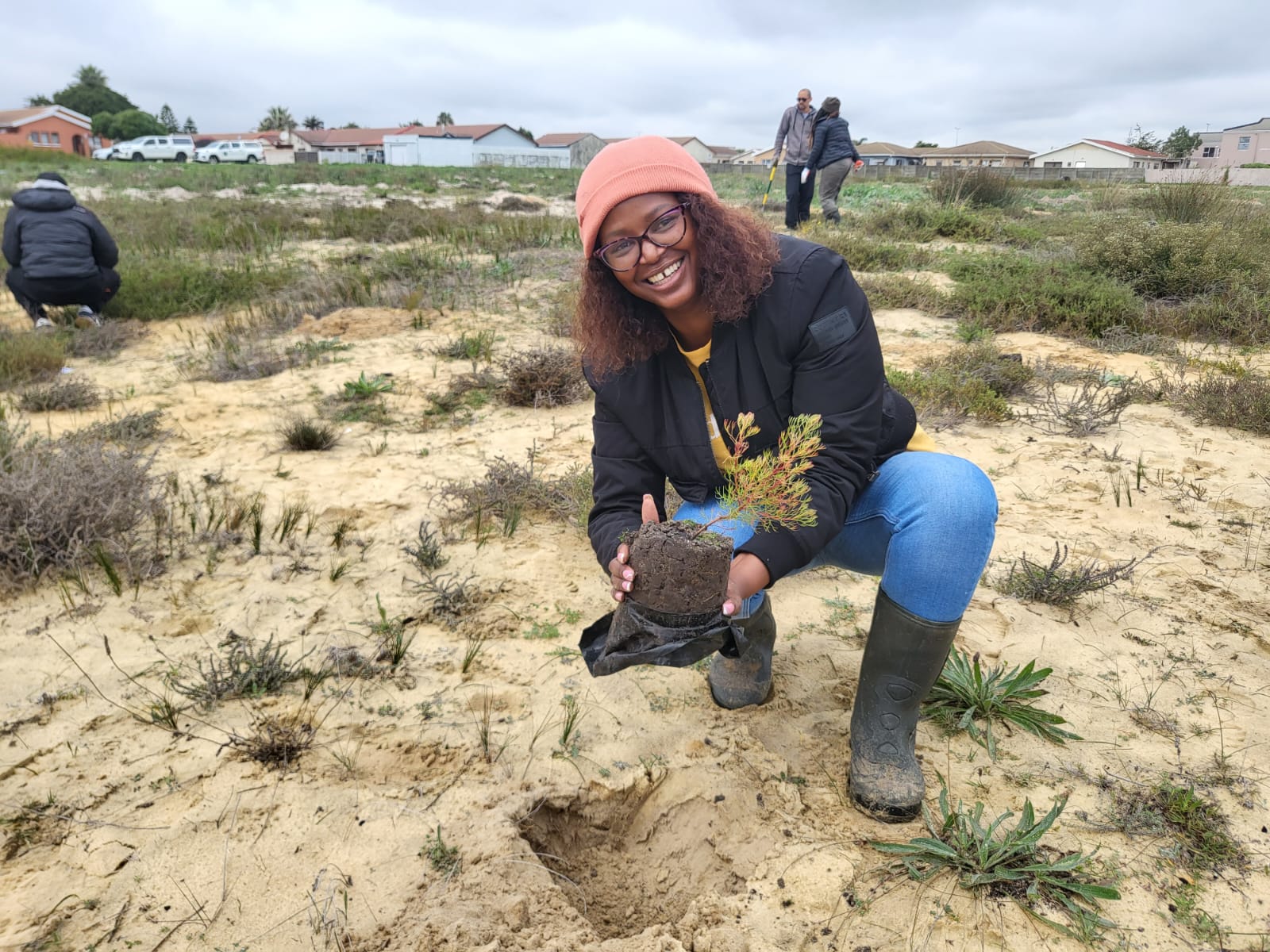What many people don’t see or talk about is the struggle in the journey; the struggle is longer than the success
The phenomenon behind some of Africa’s hallmark film and TV productions is a 40-year mother of one, whose success was no accident. Through sheer grit and hard work, Appie Matere went from hawking goods from door to door to founding and serving as the Executive Producer and CEO of Zamaradi Productions, a media enterprise that avails independently produced African content to global audiences.
She is affiliated with numerous award-winning films, documentaries and TV shows that have left an indelible mark across Africa.
In her capacity as the CEO of Zamaradi Productions, she has overseen an exceptional output of over 120 hours of local digital content in the last 5 years, providing invaluable employment opportunities for over 200 young people in the process. In 2017, Appie joined the Africa Digital Media Institute (ADMI) faculty where she now teaches certificate and diploma courses in Film and TV production.
She is also part of the Multichoice Talent factory where she facilitates film production master classes in Ethiopia, Tanzania and Uganda.
Appie shares her inspirational journey with Damaris Agweyu.

Appie, how did you get into the film industry?
Was it by chance…or maybe fate? I didn’t study film. I never grew up thinking this is where I’d end up. How I got into film has a lot to do with how I got to Nairobi.
And how did you get to Nairobi?
My mum, who struggled to raise three kids on her own, couldn’t afford the fees to pay for my university education. She could only pay for one of us and it happened to be my big brother. So after I completed high school at Chogoria girls, she told me to apply to a Teachers’ Training College. I didn’t want to be a teacher. I was very clear about that. I wanted to be a nurse. She tried to get me into a nursing course but it didn’t come through, I guess we didn’t have the money to bribe our way in. I ended up working at the ministry of Mines and Geology in Embu as an office runner. I later became a polling clerk during the elections and later, my mum got me a job as a court clerk. I was only 18 and very naïve. A friend of mine and I were caught undoing our hair braids in the lawyer’s office and we were fired. Then I got a job selling hardware. My mum got transferred to shags (the village) but I had no intention of spending the rest of my life there. Still, I moved with her. Then the letter came for joining the Teachers’ College. My mum was insistent that I should go but I was adamant.
One day, while she was at work, I packed some clothes and left home. I walked for about 20 kilometres to the nearest town to get a matatu to Embu town. I went back to the place where we used to live. My auntie had taken over our old house and I told her the truth: I wasn’t going to join a Teachers’ College, my mum had refused to listen to me and I wasn’t going back to the village. She took me in and the next day, I went to the hardware store where I’d been working and asked for and got my job back. After my first month’s salary, I moved out of my auntie’s house and started living alone. I was 19. An old neighbour of mine who I’d grown up with, she was practically my sister, came to visit and together we decided to go to Nairobi to look for work. Two weeks after our conversation, I sent some of my things to my mum’s and we left.
Did you have a job? Somewhere you were going to live in Nairobi?
No. We found a tiny room in Mathare North. It wasn’t a nice place by any standards but it worked at that time. I remember the dirty communal bathrooms that forced us to shower in our room. I started looking for jobs in the newspapers and found an advert asking young who were people looking for jobs to go to Sonolux House. I went and discovered they were offering sales job- they called it merchandising but it was really hawking. I took the job.
What were you hawking?
Pencils, kitchen towels, knives... It was hard but I was good at my job. I sold a lot and got paid in commissions.
How much were you making?
50 to 100 bob per day, enough to buy me one meal and cater for my transport. My mum sent word that I needed to go and live with an auntie of mine and I did for a bit but it didn’t work out. I later moved in with a co-worker and friend who was living in a big five-bedroom house in Kileleshwa. We were both sent to Kisumu and then Mombasa to sell summer hats. In Mombasa, we finished our stock within three days then went to the beach to enjoy ourselves. But as soon as we got back to Nairobi, we were fired…apparently, we were supposed to help the others sell their stock after we’d finished selling ours. Anyway, once again, I found myself jobless. But during my hawking time, I’d been offered another sales job. This time it was an office job, where I would be a real estate agent of sorts.
Of sorts?
It was very vague. After about three months of working there, I realized the houses they were advertising may or may not have existed as advertised. There was a time a guy came to the office fuming that we had sold him a brothel instead of an apartment, I was clueless…
Uh-huh. I’ve been a victim of those scams.
A lot of people have. One day a mob showed up baying for the blood of anyone who worked in the office. That was the day we locked the office, went home and I never went back. Christmas came, I travelled to shags and even though I had no idea how I was going to survive, I still came back to Nairobi.
During one matatu ride, I happened to meet a guy called Duncan Muhindi who had been one of my previous sales clients. I told him I was looking for work and he asked me if I had a CV. I said no. He told me to go to his office where I could create one. I was given a tutorial on how to use an iMac and typed out my CV. Duncan then introduced to someone who needed people to sell advertising space and branded materials. This job was a step up because here, I’d be going for meetings with potential clients, making presentations and creating orders. The business was struggling and Duncan left. But he didn’t want to leave me behind so he introduced me to another potential employer, Njeri Karago. She was the Executive Producer at Baraka Films. I was interviewed by her and Bob Nyanja. Again, I was asked for my papers. I had none. They asked me if I could type. I said I was self-taught. They offered me a job as a PA.
They had just released a movie called Dangerous Affairs and were looking to aggressively sell DVDs; since selling was what I was really good at, I introduced the tactics I had learned in my previous work. We managed to sell 1000 DVDs which was really good but as a PA, I was struggling. During meetings, everyone had these accents I couldn’t keep up with. There was also the film terminology to contend with, most of which was alien to me. In meetings, I would just write what I thought I heard. I remember Njeri asking why I was writing minutes in Chinese (laughs). They later produced a film called Babu’s Babies, followed by Project Daddy. And all this time, as I was doing my PA work, I was also learning about film making. This paid off because I became a production assistant in the office then moved on to Production Manager. By the time we were working on a film called Pumzika, I was a line producer.
You moved from PA to production assistant to production manager and then line producer in a span of?
It took roughly 2 years.
How is it that you moved up so fast?
I worked hard. Really hard. I realized I didn’t have the credentials for the job. I was not from a privileged background. In those days, there were no film schools here in Kenya. Anyone who went to film school had to have the money to study abroad. I didn’t have that. I had to prove to everybody that I belonged. So I used to be the first person in the office and the last to leave.
By the time we were working on The White Maasai -a German film -I had learnt a lot about film making. Interacting with the Germans further broadened my exposure. I learnt the value of discipline and attention to detail. The German’s were extremely thorough… a typo in a document and you have to redo the entire thing. Baraka Films closed down in 2004. I moved on and joined 'Pontact Films', where I worked on another German film, Heart of Fire. Thereafter, I worked on the TV series Changes by M-Net.
What was the first film you ever produced?
Killer Necklace. It did very well and opened so many new doors for me as I travelled a lot and attended many workshops and festivals. Afterwards, working under Judy Kibinge, I produced a documentary titled 50 Years Journey for the Nation Media Group. Now I’d done my short film, a series and a feature documentary. I was hungry for more. On Season III of Changes Series, I was privileged to work under Laurence Lurie who was the Executive producer for Egoli. That was huge! Having never worked on a telenovela, I was really excited by the prospect of such a challenge. I got a chance to go to South Africa to see how telenovelas are produced. Let me tell you Laurence Lurie is a genius! Wow… he’s good at his job. He asked me what I wanted to do next and I said I had an idea for a documentary about boxing. I’d fallen in love with documentaries after working with Judy. Laurence was open to the idea so together, we co-conceptualized and co-produced the Telenovela Kona.

The cast of Kona, the telenovela
What exactly does an Executive Producer do?
You convince people to invest in an idea and then hire the right people to oversee its conceptualization and production, which has to happen within the set-out timeline, a budget and without compromising the quality standards.
Kona was a huge success.
Yes. We shot 250 episodes commissioned M-Net. We had a great budget and exposure, both of which benefited our people.
This is when you made a name for yourself?
I suppose. Things were going great. Shortly before the completion of Kona, M-Net was keen to commission 56 movies that they wanted me to produce. I proceeded to do so under Zamaradi Productions Limited. We produced them in 6 months.
56 films in 6 months?
Yes… it was an intense project whose timeline required that we produce 3 films per week. Not only that, but we had to have scripts for Tanzania and Uganda. We managed to have one of the films done by an entirely Ugandan creative team.
And you produced all of them on your own?
No. I was still working on Kona and was pregnant so I definitely needed help. I partnered with Njoki Muhoho who came on board as my co-Executive Producer, focusing on the scripts. It was quite hectic but we managed to deliver all the contracted films. Subsequently, we earned a follow-up contract to produce 60 more films. Unfortunately, there were changes in management at M-Net and the new team distributed these films among a number of other producers, leaving us to produce just 15 of them.
Just as we were about to finish -7 months into my pregnancy- our offices were robbed. My anxiety has never been so high. All our cameras and 7 edit suites were stolen. You know how pregnant women are always eating. Well, for the first time in my pregnancy I didn’t feel hungry. It was so stressful. The fact that they forgot some drives with the footage and the fact that I had such a great team supporting me saved me. The robbery took place on a Thursday and by Monday we were back to shooting. The support was overwhelming - camera guys offered their cameras and editors worked from their edit suites and laptops at home.
Did you manage to deliver on time?
Despite the setbacks, we did deliver all 71 films as contracted. Then after the M-Net project, I partnered with George Mungai, Victor Gatonye and Gibson Mithaa to run Zamaradi. One thing we miss as film companies is the long term view in terms of the business elements. In that regard, I can say we were lucky to have Gibson on board since he has good insights in Strategic Management and Finance.
As a team, we sought to build a creative entity that would create African content for licensing by diverse broadcasters. Some of what we have worked on includes Sunrise and Trade Center –which were co-produced with ZUKU; Nyumba Ten –which was licensed to M-Net and another 5 TV Series that were pre-licensed to StarTimes. In total, we have about 140 hours of content that we own. But getting to this point came at a very high price both professionally and personally.
Tell me more.
You see, pre-licensed and licensed productions require that the producer continually finance their productions. At best, broadcasters make only a 50% down-payment, the final payments are made after completion and delivery. As a production house you have to constantly borrow funds to operate. It can take 3 to 6 months to repay. On our part, this situation worsened when Chase bank collapsed since banks stopped lending and we found ourselves in huge debt. After building a good name over the years, here I was owing money to artistes and suppliers. Hashtags started trending and we were publically tagged. I’ve been an advocate of having artists paid well and on time, yet here I was stuck in a situation was simply beyond my control. And of course, they were within their right to demand to be paid. It was a trying time for us.
Have you recovered?
Recovery is a slow process, but we are making steady progress. A dent in your reputation takes time to repair but I am happy that some of the artists who said they’d never work with us made their peace with us and are back.
What have you learnt from that experience?
A lot! Now I know better. We craft our contractual engagements very keenly. We are open to saying no to what does not serve us. We may not be where we would ideally like to be, but we are crystal clear on who we are and what we do not want.
We have so many untapped opportunities in Africa, we haven’t even started telling our stories.
Appie Matere
For what it’s worth, I’ve never met anyone successful who has not gone through some kind of trouble.
In business, it is especially brutal due to financial implications. I never saw our challenges coming. Let’s just say it wasn’t a wasted experience. It symbolized a growth period for me. Just as gold has to go through the furnace to be refined, I believe that we have to go through such trials to come out stronger.
Is the industry growing?
Unfortunately, it feels rather stagnant. There is not much to write home about on the product-market scope frontier or incentives that would make the industry attractive as a business proposition. On the other hand, there are opportunities that indicate we are on the brink of something great. We have the internet space and need to make it work for us.
There is this new ‘African-ness’ movement in the world that we need to take advantage of. We have so many untapped opportunities in Africa, we haven’t even started telling our stories. We are still copying what Americans are doing and yet they are the ones who are now coming here and telling our stories. This is the virgin continent in every industry. So what can we do with what we have? And why are we still making films and stories to appease others?
You are the one in this space, can you answer that?
These are the questions I’m asking myself more and more. We have the resources, we have the stories and we have a huge African market! Can we as filmmakers succeed in telling our stories in our own way? I think the main challenge is getting the audience. If you do one film and don’t get much response from the public, you get discouraged.
At Zamaradi Productions, we aim to start by aligning stories to our immediate environment so that they are relatable to our African audiences. We’ve created a line called Athari films -meaning impact films- under which we’ve produced our first feature film called Dream Child.
What is it about?
The boy child. Everybody is up in arms about the boy child having no role models, being neglected blah blah but do we stop to ask why? Where is the imbalance coming from? Are we looking at the family setting? The stories happening behind closed doors in our homes? So many people will be able to relate to this story and this is the line of storytelling that Athari Films will explore.
Every year we hope to do at least 2 films of this nature and continually work towards creating and maintaining audiences. Our aim is to create new audiences and we won't do this by focusing on cinema halls or at prestigious film festivals, we will create audiences by taking the films to the people. A while back, we showcased Dream Child to a focus group. One of the guys who watched it asked, "When is my grandmother going to watch this film?" The upmarket audience is very small. We aim to take Athari films all over the country.
Watching movies is something of a luxury though. Will you be charging?
It is a luxury because we are hung up on the Western model that is out of touch with tastes and preferences of the majority of Kenyan people. Our aim is to charge as low as 100 shillings. Almost everyone can afford that. It’s what guys spend on pirated DVDs, so why not spend it on an original movie that you can actually relate to? We are partnering with the Kenya Film Commission Board on this as they have regional offices across the country.
Film making is time-consuming, how do you balance single motherhood and your work schedule?
I have help. It’s OK to get help. Motherhood is not about being a superwoman and doing everything. It’s about doing the best you can while still being true to yourself. In my case, I can be on set at 6 am and wrap at 10 pm, sometimes for 2 weeks straight with only one day off. I need good help at home. It was after reading The Year of Yes by Shonda Rhymes that I started feeling less guilty about some of these things. I felt I could relate to what she was communicating in the book. I would urge more women to respect and empower their nannies. You will crash and burn if you try to be a superwoman.
What is your definition of success?
I need to be able to make enough money to earn a decent living but beyond that, if I can inspire and empower others to become the best they can be, then that is true success for me.
For more wisdom and insights from Appie Matere, get your copy of Different Paths, One Journey HERE.





